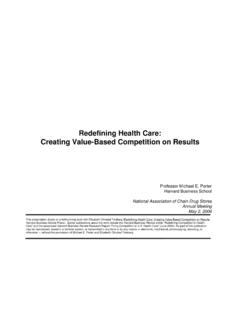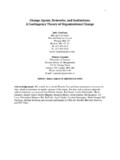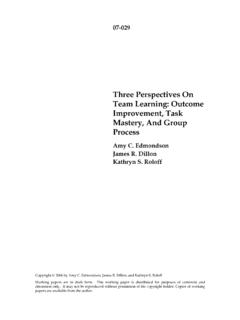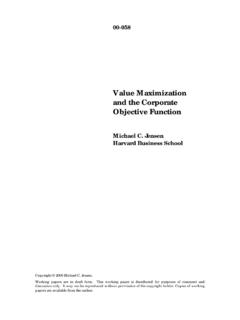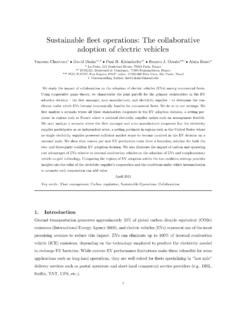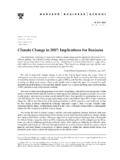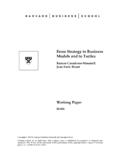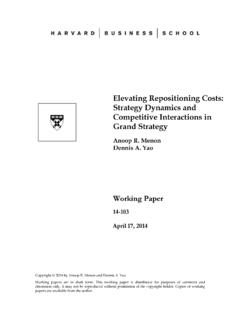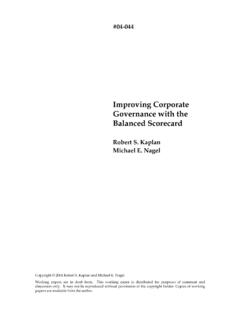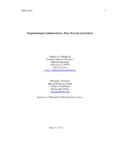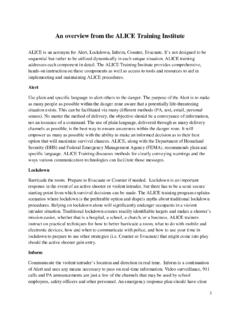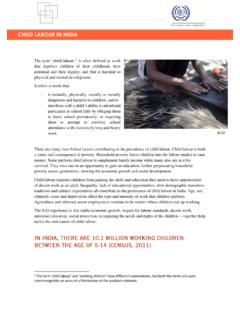Transcription of The Impact of COVID-19 on Small Business Outcomes and ...
1 The Impact of COVID-19 on Small Business Outcomes and Expectations Alexander Bartik Marianne Bertrand Zo B. Cullen Edward L. Glaeser Michael Luca Christopher Stanton Working Paper 20-102 Working Paper 20-102 Copyright 2020 by Alexander Bartik, Marianne Bertrand, Zo B. Cullen, Edward L. Glaeser, Michael Luca, and Christopher Stanton. Working papers are in draft form. This working paper is distributed for purposes of comment and discussion only. It may not be reproduced without permission of the copyright holder. Copies of working papers are available from the author. Funding for this research was provided in part by harvard Business school .
2 The Impact of COVID-19 on Small Business Outcomes and Expectations Alexander Bartik University of Illinois Marianne Bertrand University of Chicago Zo B. Cullen harvard Business school Edward L. Glaeser harvard University Michael Luca harvard Business school Christopher Stanton harvard Business school 1 The Impact of COVID-19 on Small Business Outcomes and expectations* Alexander W. Bartik, Marianne Bertrand, Zoe Cullen, Edward L. Glaeser, Michael Luca, and Christopher Stanton Abstract To explore the Impact of COVID on Small businesses, we conducted a survey of more than 5,800 Small businesses between March 28 and April 4, 2020.
3 Several themes emerged. First, mass layoffs and closures had already occurred just a few weeks into the crisis. Second, the risk of closure was negatively associated with the expected length of the crisis. Moreover, businesses had widely varying beliefs about the likely duration of COVID-related disruptions. Third, many Small businesses are financially fragile: the median Business with more than $10,000 in monthly expenses had only about two weeks of cash on hand at the time of the survey. Fourth, the majority of businesses planned to seek funding through the CARES act.
4 However, many anticipated problems with accessing the program, such as bureaucratic hassles and difficulties establishing eligibility. Using experimental variation, we also assess take-up rates and Business resilience effects for loans relative to grants-based programs. * We thank Karen Mills for connecting us to the leaders at Alignable and to Eric Groves, Venkat Krishnamurthy, and Geoff Cramer for immense help in facilitating survey distribution. Dylan Balla-Elliott, Manal Saleh, and Pratyush Tiwari provided excellent research assistance.
5 Author contact information is: Alexander Bartik is at the University of Illinois: Marianne Bertrand is at the University of Chicago Booth school of Business : Zoe Cullen is at harvard Business school : Ed Glaeser is at the harvard Department of Economics: Michael Luca is at harvard Business school : and Christopher Stanton is at harvard Business school : 2 1. Introduction In addition to its Impact on public health, COVID-19 has caused a major economic shock. In this paper, we explore the Impact of COVID-19 on the Small Business landscape in the United States, focusing on three questions.
6 First, how did Small businesses adjust to the economic disruptions resulting from COVID-19 ? Second, how long did businesses expect the crisis to last, and how do expectations affect their decisions? Third, how might alternative policy proposals Impact Business and employment resilience? To explore, we surveyed more than 5,800 Small businesses that are members of Alignable, a network of million Small businesses. The survey was conducted between March 28 and April 4, 2020. The timing of the survey allows us to understand expectations of Business owners at a critical point in time when both the progression of COVID-19 and the government s response were quite uncertain.
7 The results suggest that the pandemic had already caused massive dislocation among Small businesses just several weeks after its onset and prior to the availability of government aid through the CARES Act. Across the full sample, 43 percent of businesses had temporarily closed and nearly all of these closures were due to COVID-19 . Respondents that had temporarily closed largely pointed to reductions in demand and employee health concerns as the reasons for closure, with disruptions in the supply chain being less of a factor. On average, the businesses reported having reduced their active employment by 39 percent since January.
8 The decline was particularly sharp in the Mid-Atlantic region (which includes New York City), where 54 percent of firms were closed and employment was down by 47 percent. Impacts also varied across industries, with retail, arts and entertainment, personal services, food services, and hospitality businesses all reporting employment declines exceeding 50 percent; in contrast, finance, professional services, and real estate related businesses experienced less disruption, as these industries were better able to move to remote production. Our results also highlight the financial fragility of many Small businesses.
9 The median firm with expenses over $10,000 per month had only enough cash on hand to last approximately two weeks. Three-quarters of respondents reported that they only had enough cash on hand to 3 cover two months of expenses or less . Not surprisingly, firms with more cash on hand were more optimistic that they would remain open by the end of the year. Our survey also elicited businesses beliefs about the evolution of the crisis, allowing us to study the role of beliefs and expectations on decisions. The median Business owner expected the dislocation to last well into mid-summer, as 50% of respondents believed that the crisis would last at least until the middle of June.
10 However, beliefs about the likely duration of the crisis varied widely. This raises the possibility that some firms were making mistakes in their forecasts of how long the crisis will last. The crisis duration plays a central role in the total potential Impact . For a crisis lasting 4 months instead of 1 month, only 47% of businesses expected to be open in December compared to 72% under the shorter duration. There is also considerable heterogeneity in how sensitive businesses are to the crisis. In-person industries like personal services or retail reported much lower prospects for riding out the pandemic than professional services or other sectors with minimal need for face-to-face contact.
